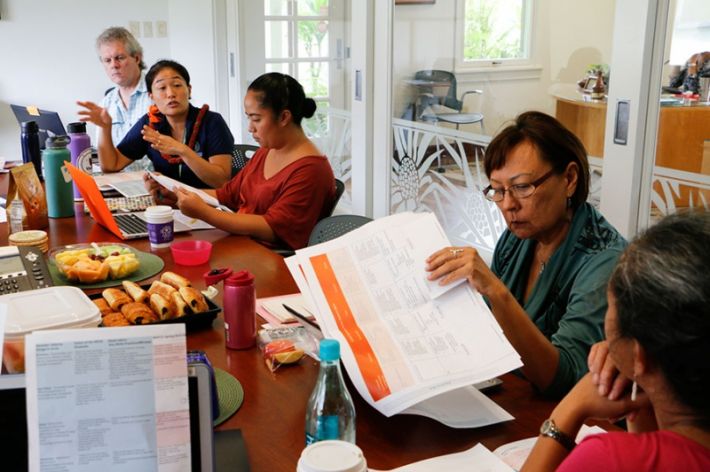For the past 15 years, educational assessments have focused on high stakes standardized assessments associated with the No Child Left Behind Act. In the early 2000s Hawaiian Focused Charter Schools (HFCS) were created to provide teaching and learning environments grounded in Hawaiian language and values. Although students thrive in school settings that place Hawaiian language and culture at the forefront of learning, they are mandated to complete assessments that ineffectively communicate the breadth of student understanding and progress.
“Our work is important because it helps students take ownership of learning and gives them a voice in determining what is important to learn and how they want to be assessed. It’s more student-driven than teacher and school driven,” said Allyson Tamura, poʻo kumu (principal) of Kanu O Ka ʻĀina Elementary
HFCS poʻo kumu are committed to contributing to the ability of all public schools to tell a richer story of student and school success through the three-year HFCS Culturally Relevant Assessment (CRA) Project.
“(CRA) project is a supportive network for poʻo kumu and provides opportunities for professional development,” said Denise Espania, poʻo kumu of Mālama Honua Learning Center. “We developed an organic process grounded in culture first and foremost, without losing sight of the Western expectations we are accountable for that still help to guide our (CRA) work.”
HFCS are interested in sharing individual and collective stories through student-focused evidence and communicating learner growth and school success holistically.
“We are developing a process that involves all stakeholders, including students, teachers, and parents. Everyone has an active role ensuring that student goals are successfully accomplished,” added Tamura.
The HFCS Culturally Relevant Assessment (CRA) project cascades from the HFCS Vision of the Graduate that was created in 2013 and reflects the common values across all HFCS.
According to Espania, the CRA ensures that evaluation reflects HFCS school values and recognizes that students need to have the right place and elements around them, a strong cultural tie and an understanding of where they come from and where they’re headed.
All HFCS poʻo kumu are collaboratively developing a set of assessments that reflect HFCS unique mission and document student progress toward achieving the HFCS Vision of the Graduate in the following areas.
- Readiness for the next level within community, formal schooling, post-secondary education, training, and career;
- Interim Growth measures that reflect progress toward attainment of the mission and vision of schools; and
- Cultural Commitment framework that will assess and communicate student connectedness and contributions to community that will directly affect college and career success.
“I think the process and outcomes from this (CRA) work is so valuable because it represents best practices for any school.” Espania said. “We are saying it’s not only about the test score, not solely about the numbers. It’s recognizing that education is not just pencil and paper learning or memorization – it’s beyond just information someone gives you. What we’re doing is valuing rigor, relevance and relationships.”
Project Principles
- Lead by HFCS poʻo kumu
- Honors unique HFCS missions
- Celebrates school similarities
- Cascades from the HFCS Vision of the Graduate
- 3-year pilot 2014-2017
- Supported by KS Hoʻolako Like Department (HLD)
- Facilitated by HLD School Improvement Specialists
- Aligned with Nā Hopena Aʻo (Hā) DOE Policy E3

Cultural Commitment Work Group debriefing cultural protocol observations.

Cultural Commitment Work Group conducts school visits and observes cultural protocol such as Mālama Honua Learning Center’s piko.
TAGS
strategic plan,
sp 2020,
charter schools,
hoolako like,
hawaiian culture based education,
culture,
community education
CATEGORIES
Kaipuolono Article, Newsroom, Community Education
Print with photos
Print text only










